Coronavirus scam calls and texts
Ofcom has received yet more reports of scam calls and texts relating to the coronavirus. Scammers call home phones and send text messages to mobile phones, which contain misinformation or could leave you out of pocket.
Some calls and texts claim to be from the Government, the NHS, your GP Surgery, or even the World Health Organisation (WHO). In the calls, a caller or recorded message will claim to be contacting you about the coronavirus. They might offer you treatment, a test or even a cure, or they may want to discuss your medical needs.
However, all of these calls encourage you to either speak to somebody or press a button for more information. If this happens to you, please be aware and very careful.
If you speak to somebody, don't give them any personal or financial details; if you do, it could result in identity theft or financial loss.
If you press a button on your phone, you can be connected to a premium rate number, leaving you with a large telephone bill.
Scam texts – what to look out for
Scam text messages often include links or attachments. You cannot trust these messages, and you should never click on their links or attachments.
Below is an example of a scam text message claiming to be from the Government. This message is offering a payment related to the coronavirus. The image on the left is the text message, and the image on the right is the web page you'll be taken to if you click on the link in the text.
However, look at the website address in the image on the right; it's not the UK Government website address, it's a fake website that asks you to enter your personal details. This is known as a "phishing" scam.
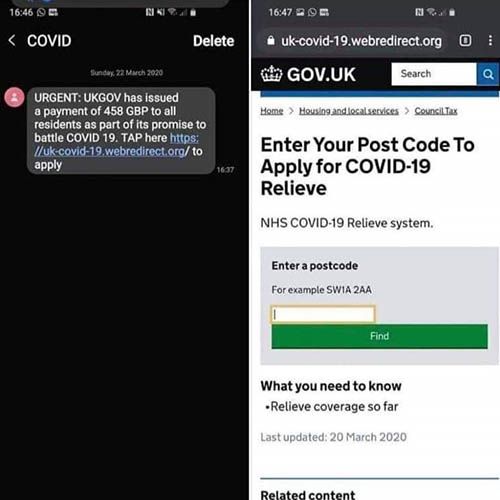
There are also scam text messages that mimic UK Government text alerts. The scam text message below claims you are being fined for leaving your home. Like the other example, the test asks you to click on a link. You should never trust this type of message, and you definitely should not click on the link.
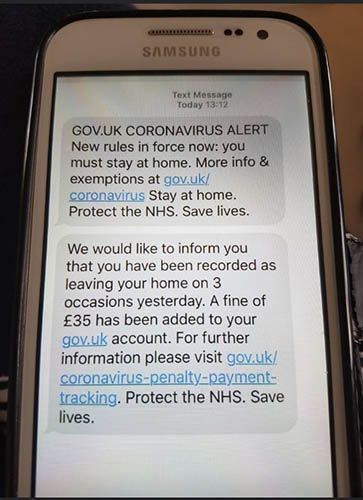
If you receive a call or text that you think might be genuine – from your GP Surgery, for example – you should call your GP's surgery to check whether they have tried to contact you.
Calls claiming to be from Ofcom
Some scam calls are claiming to be from Ofcom.
The caller or message will tell you that your broadband connection needs to be switched off or slowed down because so many people are now working from home.
As usual, you will be encouraged to speak to somebody or press a button for more information. Again, you cannot trust this type of call. Ofcom would never call you about your broadband. If you receive one of these calls claiming to be from Ofcom, hang up immediately.
Genuine Government text alerts
The UK Government has been sending out official alerts to mobile phones. These are legitimate text messages that contain updates on the latest Government advice about coronavirus.
These texts messages are sent from 'UK_Gov' and look like the image below:
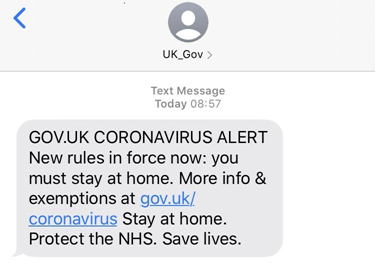
The texts messages from the Government use the exact wording regardless of which mobile network you use.
If you receive a text message that looks different to the example above, it's unlikely to be a genuine Government message. You should therefore ignore it, delete it and report it.
Coronavirus tracking app scams
There are also reports about a phishing scam based on the Government's coronavirus tracking app. Some people have been sent text messages that look like this.
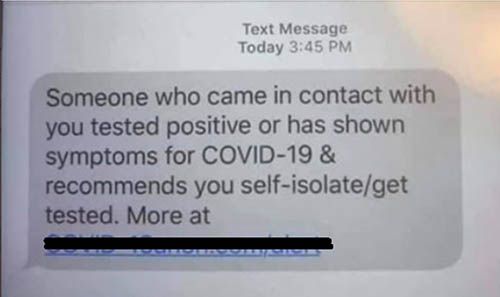
This is not an official text message, and you should not click on the link. If you receive a text message like this, please ignore it, delete it and report it.
Scams calls and texts about Covid-19 vaccination
There are also reports of phishing scams relating to Covid-19 vaccinations.
You will receive a call or text message claiming to be from the NHS. Like the other scam calls and text messages, you will be encouraged to click on a link, speak to somebody or press a button.
These are scam calls and messages designed to get you to hand over your personal information.
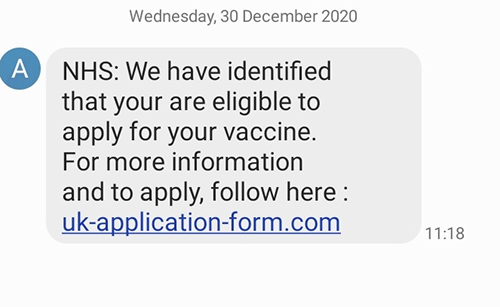
The link in the text message will take you to a fake NHS website that asks for your personal details, this is a phishing scam, and you should not click on the link.
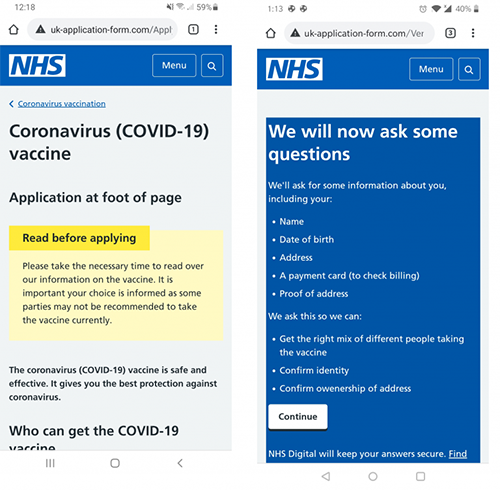
Scams emails about Covid-19 vaccination
There are also reports of scam emails relating to coronavirus vaccinations. These emails claim to be from the NHS, but they are phishing emails sent by scammers.
At first glance, these emails seem genuine and are quite convincing, but if you check the sender, you will see that the NHS has not sent it. As with all phishing texts and emails, do not click on any links.
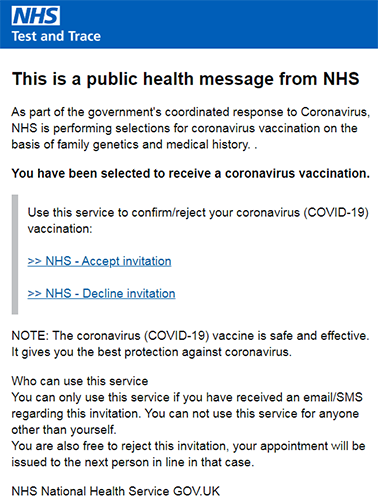
What to do if you receive a scam text or email
Scam Emails
If you receive a suspicious email, forward it to report@phishing.gov.uk.
Text Messages
If you receive a suspicious text message, forward it to 7726, which is free of charge.
Phone Calls
If you receive a suspicious call or believe you are the victim of a fraud, please call Action Fraud by calling 0300 123 2040 or visiting www.actionfraud.police.uk.
Action Fraud is the reporting centre for fraud and cybercrime in England, Wales, and Northern Ireland. Reports of fraud and any other financial crime in Scotland should be reported to Police Scotland via 101.